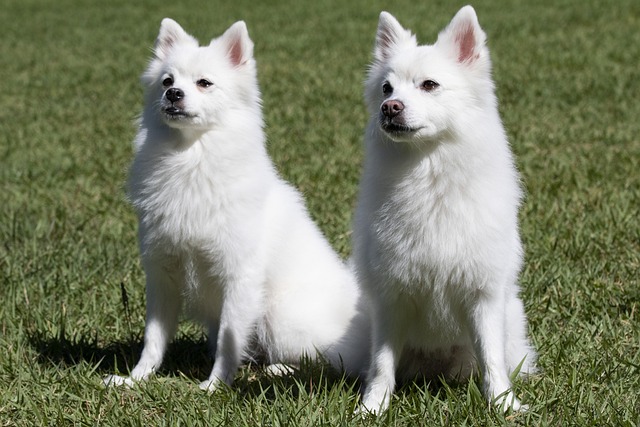
What is glaucoma in a dog?
You might notice your dog squinting more at mealtime or avoiding bright sunlight—these small changes could be early signs of a serious eye condition.
The Japanese Spitz, with its cute appearance and pure white coat, is like a fairy from a fairy tale, deeply loved by many pet lovers. When a Japanese Spitz in the family gets pregnant, it is undoubtedly an exciting yet nerve - wracking event. Understanding the pregnancy symptoms of the Japanese Spitz can help us take better care of it during pregnancy and welcome the arrival of new lives.
Physiological Changes: Subtle Signals from the Body
1. Changes in Nipples
In the early stages of pregnancy, the nipples of the Japanese Spitz begin to change. Attentive owners will notice that the nipples gradually become fuller and more ruddy, just like delicate pink flower buds quietly blooming. This is the body's preparation for nursing the puppies in the future. As the pregnancy progresses, the hair around the nipples gradually becomes sparse, making them more prominent. Gently squeezing, a small amount of clear liquid can even be seen secreted. This is the development of the mammary glands, preparing for the puppies' food supply.
2. Changes in the Abdomen
Around 20 days into pregnancy, the abdomen of the Japanese Spitz starts to show subtle changes. Its abdomen gradually becomes rounder. When gently touched, an increase in the size of the uterus can be felt. As the puppies grow in the uterus, the abdominal changes become more and more obvious. Viewed from the side, the body contour presents a rounded arc. In the later stages of pregnancy, obvious abdominal undulations can be seen, which are the puppies moving in their mother's belly, as if announcing their presence to the world.

3. Changes in Weight
Weight gain is also an important sign of a pregnant Japanese Spitz. After getting pregnant, the weight of the Japanese Spitz gradually increases due to the growth of the puppies, the increase in amniotic fluid, and the physical changes of the female dog itself. However, the extent of weight gain needs to be closely monitored by the owner. The female dog should neither become overly obese, which may affect childbirth, nor have insufficient weight gain, resulting in poor puppy development.
Behavioral Changes: Fluctuations in Emotions
1. Changes in Appetite
In the early stages of pregnancy, the Japanese Spitz may experience a decrease in appetite, similar to the morning sickness reaction in human pregnancy. It may lose interest in the food it usually loves, which makes the owner worried. But after this period, the appetite gradually recovers and may even become more voracious. It will actively look for food, seemingly knowing that the babies in its belly need more nutrition. During this stage, the owner should carefully prepare food, ensuring it is rich in nutrition and taking into account the Japanese Spitz's taste preferences.
2. Lethargy and Drowsiness
A pregnant Japanese Spitz becomes more lethargic and drowsy. It often finds a quiet and comfortable corner to curl up and sleep. This is because pregnancy consumes a lot of its energy, and it needs more rest to regain strength. When the owner sees it like this, do not disturb it forcefully. Instead, create a quiet and warm resting environment for it so that it can rest assured and nurture the fetus.
3. Emotional Sensitivity
The Japanese Spitz becomes particularly emotionally sensitive during pregnancy. It may show unease when the owner leaves, and when strangers approach, it may become alert and even somewhat aggressive. This is a maternal instinct, as it is protecting the puppies in its belly. At this time, the owner should give it more companionship and comfort, talk to it softly, and stroke it gently, so that it can feel the owner's love and support.
Health Care: Guarding the Angel During Pregnancy
After noticing these pregnancy symptoms in the Japanese Spitz, the owner should take on a heavier responsibility. Take it to the pet hospital for regular check - ups to ensure the health of both the female dog and the puppies. In terms of diet, provide food rich in protein, vitamins, and minerals, such as high - quality dog food, fresh meat, and vegetables. At the same time, ensure it has sufficient drinking water and allow it to exercise appropriately, but not too strenuously.
The pregnancy of a Japanese Spitz at home is a wonderful journey of life. Watching the changes in its body and behavior, we feel the magic and greatness of life. As owners, we should take good care of it with our hearts, accompany it through this special time, and welcome the arrival of the lovely puppy babies. The birth of every life is a beautiful gift. Let us welcome this gift with love and witness the happy growth of the mother Japanese Spitz and the puppies.

You might notice your dog squinting more at mealtime or avoiding bright sunlight—these small changes could be early signs of a serious eye condition.

Let’s set the scene: It’s a sweltering Phoenix afternoon—105°F outside—and you rushed your 2-year-old Lab mix, Cooper, on a quick walk to “get it over with.”

Let’s get real: You’re in your Miami apartment, watching your 3-year-old Corgi, Loki, struggle to climb the stairs to your second-floor unit.

Many dog owners brush off occasional scratching as just “dog behavior,” but persistent itching often signals something more—like a food allergy.

You might first notice your dog scratching more than usual—chewing at their paws until the fur looks thin, or rubbing their face against the couch nonstop.

Let’s be real: You’re standing in your Chicago apartment, watching your 3-year-old Beagle, Max, huff and puff just to climb onto the couch.